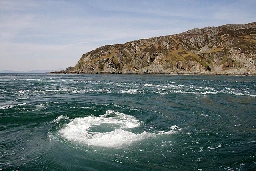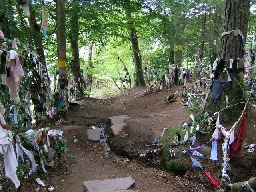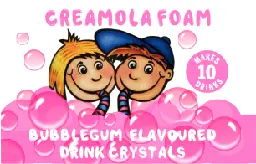
-
Gulf of Corryvreckan
The Gulf of Corryvreckan (from the Gaelic Coire Bhreacain, meaning 'cauldron of the speckled seas' or 'cauldron of the plaid'), also called the Strait of Corryvreckan, is a narrow strait between the islands of Jura and Scarba, in Argyll and Bute, off the west coast of mainland Scotland.
Strong Atlantic currents and unusual underwater topography together produce a particularly intense tidal race in the Corryvreckan channel. As the flood tide enters the narrow area between the two islands it speeds up to 8.5 knots (16 km/h) and meets a variety of seabed features, including a deep hole and a rising pinnacle. These features combine to create whirlpools, standing waves and a variety of other surface effects.
The Corryvreckan is the third largest whirlpool in the world, and is on the northern side of the gulf, surrounding a pyramid-shaped basalt pinnacle that rises from depths of 70 to 29 m (230 to 95 ft) at its rounded top. Flood tides and outflow to the Firth of Lorne in the west can drive the waters of Corryvreckan to waves of more than 30 ft (9 m), and the roar of the resulting maelstrom can be heard 10 mi (16 km) away.
In Scottish mythology the hag goddess of winter, Cailleach Bheur, uses the gulf to wash her great plaid, and this ushers in the turn of the seasons from autumn to winter. As winter approaches, she uses the gulf as her washtub, and it is said the roar of the coming tempest can be heard from as far away as twenty miles (thirty kilometres), lasting for a period of three days. When she is finished with the washing, the cloth is pure white, and becomes the blanket of snow that covers the land.
The Cailleach occupying the whirlpool was described as "the fiercest of the Highland storm kelpies"
-
HERMIT'S CASTLE
www.undiscoveredscotland.co.uk Hermit's Castle Feature Page on Undiscovered ScotlandInformation about and images of Hermit's Castle at Achmelvich in Sutherland on Undiscovered Scotland.
The remarkable Hermit's Castle, on the shore at Achmelvich near Lochinver in Sutherland.
This concrete folly was built in 1950 and, so the story goes, used for just one weekend before being abandoned.
Hermit's Castle can be described in many ways. It's been called Europe's smallest castle: though, despite the name, calling it a "castle" is stretching a point a little. A possibly more accurate description is that it is a remarkable concrete folly built in a Brutalist style that blends in a very surprising way into its rocky shoreside setting. What adds to its attraction is the slight air of mystery that surrounds it. The bare facts behind its presence in this location are fairly clear (though not universally agreed upon), but the important question about why it came to be built here seems to have gone unanswered.
-
Get Westminster tae fuck
syzito.xyz MiniMia 🏴 🇵🇸 (@[email protected])Attached: 1 video "Get Westminster tae fuck" Well said that man 😂 🏴 #ScottishIndependence

Repost from mastodon.scot
- theferret.scot Billionaires, lobbyists and a 'dark money' trust': Who funds Scotland's parties?
Billionaires, corporate lobbyists, a representative of King Charles, people with tax haven links, and a “dark money” trust are funding Scotland’s parties.

Under electoral laws, a donation is money, goods or services worth over £500 and given freely to a party, including property, sponsorship, or use of office space. There is no limit to how much a donor can give.
Our analysis found that Scottish Labour received £1.2m – a third of all donations and the most of any Scottish party.
Labour donors include Renfrewshire gas generator firm, Peak Scientific Holdings, and its parent, Dusty TLP, which gave the party £400,000 – plus £100,000 to UK Labour. It also bankrolls the Lib Dems, and funded the UK Tories until 2020.
The firms “are not at liberty to disclose the reason for party donations”, a spokesperson said.
-
Calvine UFO - Latest News -

YouTube Video
Click to view this content.
Nick Pope famously claimed that the Calvine UFO photograph was one of the best he had ever seen. A copy of it hung on his office wall at the Ministry of Defence (MoD) in London, and when he asked about it he was staggered to discover that the MoD had been unable to identify the ‘ship’ or the nearby aircraft.
- theconversation.com Stigma against benefits has made devastating poverty acceptable in Britain
The ‘skivers against strivers’ view of welfare keeps people in poverty feeling ashamed and isolated.

Britain is in a poverty crisis. Over 14 million people (one in five) are living in poverty. Of these, 4 million, including 1 million children, are classed as destitute: regularly unable to meet basic needs for shelter, warmth, food and clothing.
Cuts to the welfare state over the last decade have contributed to a deepening of poverty in Britain not seen in any of its European neighbours. What sets Britain apart (and has made it possible for these cuts to continue) is the intense stigma placed on people living in poverty and who receive state benefits.
- phys.org Gravitational wave researchers cast new light on Antikythera mechanism mystery
Techniques developed to analyze the ripples in spacetime detected by one of the 21st century's most sensitive pieces of scientific equipment have helped cast new light on the function of the oldest known analog computer.
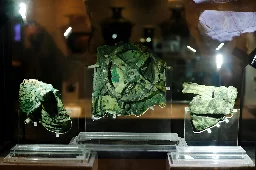
Techniques developed to analyze the ripples in spacetime detected by one of the 21st century's most sensitive pieces of scientific equipment have helped cast new light on the function of the oldest known analog computer.
Astronomers from the University of Glasgow have used statistical modeling techniques developed to analyze gravitational waves to establish the likely number of holes in one of the broken rings of the Antikythera mechanism —an ancient artifact which was showcased in the movie "Indiana Jones and the Dial of Destiny."
While the movie version enabled the intrepid archaeologist to travel through time, the Glasgow team's results provide fresh evidence that one of the components of the Antikythera mechanism was most likely used to track the Greek lunar year. They also offer new insight into the remarkable craftsmanship of the ancient Greeks.
-
Clootie well
A clootie well is a holy well (or sacred spring), almost always with a tree growing beside it, where small strips of cloth or ribbons are left as part of a healing ritual, usually by tying them to branches of the tree (called a clootie tree or rag tree). Clootie wells are places of pilgrimage usually found in Celtic areas. It is believed the tradition comes from the ancient custom of leaving votive offerings in water.
In Scots, a clootie or cloot is a strip of cloth or rag.
In Scotland, by the village of Munlochy on the A832, is a clootie well (called in Scottish Gaelic: Tobar Churadain) at an ancient spring dedicated to Saint Curetán, where rags are still hung on the surrounding bushes and trees. Here the well was once thought to have had the power to cure sick children who were left there overnight. The site sometimes needs to be cleared of non-biodegradable materials and rubbish such as electrical items and a venetian blind.
In the heart of Culloden woods near the battlefield is a walled clootie well also known as St Mary's well. This well was traditionally visited on the first Sunday in May. Until recently, it was a popular holiday, with an ice-cream van situated in the car park. However, this tradition is now in decline although still marked.
Craigie Well at Avoch on the Black Isle has both offerings of coins and clooties. Rags, wool and human hair were also used as charms against sorcery, and as tokens of penance or fulfilment of a vow.
A clootie well once existed at Kilallan near Kilmacolm in Renfrewshire. This holy well was dedicated to St Fillan and cloth was tied to overhanging shrub branches.
-
The UFO that was investigated by the police for assaulting a Scotsman with its massive balls

YouTube Video
Click to view this content.
The UFO that was investigated by the police for assaulting a Scotsman with its massive balls
-
BANNOCKBURN
www.undiscoveredscotland.co.uk Bannockburn Feature Page on Undiscovered ScotlandInformation about and images of Bannockburn battlefield near Stirling on Undiscovered Scotland.
Scotland commemorates, and to a degree celebrates, what most people view as the most significant victory won by Scotland over an invading English army. The Battle of Bannockburn took place on 23 and 24 June 1314.
It marked a turning point in the Wars of Independence between Scotland and England: cementing King Robert the Bruce's grip on Scotland; weakening Edward II's grip on England; and, arguably, deferring the Union of the Crowns of England and Scotland by nearly three centuries.
The general background to the Battle of Bannockburn is clearly established. The starting point was the accidental death of King Alexander III of Scotland in 1286. When his only heir, his young granddaughter, Queen Margaret, Maid of Norway, then died while sailing back to Scotland from Norway, it left Scotland torn between rival factions.
Inviting King Edward I of England to adjudicate between the competing claims for the Scottish crown probably seemed the only way to avoid civil war, but turned out to be inviting the fox into the henhouse. The complex Wars of Independence that followed saw Edward I fully justify the nickname of "The Hammer of the Scots" until his death in 1307.
- theferret.scot Scottish Tories handed nearly £100k by billionaire family behind tax haven firm
The Scottish Tories have been given £96,000 by members of an influential billionaire family behind a company ultimately owned in an offshore tax haven.

Jardine Matheson is a firm based in Hong Kong but incorporated in the tax haven of Bermuda. Its owners, the Keswick family, have helped to bankroll the Tory party, an anti-EU group and the pro-union Better Together campaign to the tune of nearly £2m.
The company dates back to the 1800s and its two original founders include a Dumfriesshire ancestor accused of sparking the Opium Wars, which led Hong Kong to become a British colony.
Now the family owns estates spanning thousands of hectares in south west Scotland. The vast majority (£82,000) of its Scottish donations went to the Dumfries and Galloway Tories and local politician, David Mundell (£18,000).
Jardine Matheson was founded in Hong Kong in 1832 by William Jardine, from Dumfriesshire, and James Matheson, from Sutherland, to trade tea and opium.
- www.thecollector.com Who Was Vortigern?
Vortigern is one of the most important figures in the history of Britain. What do we know about him historically, and what later legends grew up around him?
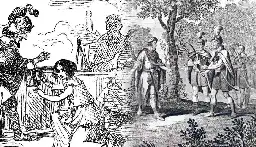
According to the available sources, a man named Vortigern became a powerful ruler over the Britons soon after the Romans left. He is presented in the medieval records as a foolish and wicked king.
Because the Britons were facing attacks from the Picts and the Scots, the British leader Vortigern came up with an idea for how to deal with the problem. He decided to hire Germanic mercenaries—the Anglo-Saxons—to help defend the borders of Britain. In return, the Germanic mercenaries would be given some territory and resources. Of course, this plan eventually backfired.
The Anglo-Saxons became dissatisfied with their end of the deal. Eventually, they turned against the Britons and started conquering more territory, ultimately leading to the creation of England. Vortigern, therefore, had a profoundly important role in the history of Britain.
-
Scotland's pupils are among the best readers in the western world - Believe in Scotland
Conclusion
Scots should think twice before accepting biassed attacks on Scottish education from Unionist politicians and the Unionist media that parrot their claims. That does not mean there are no challenges - of course there are. But despite that, Scotland has an education system to be proud of. Scottish pupils' reading levels in the international rankings table PISA are virtually the same as the ones England brags about. Scottish pupils are also offered more access to music and other arts education.
Scotland also does better in terms of the attainment and life chances of the poorest and most deprived cohort. Providing free school meals to all under tens is also likely to feed into better educational outcomes.
Scotland has chosen to raise teachers' salaries to a level more commensurate with their expertise and responsibilities. Over time this will positively impact staff retention and performance and attract more people to the profession.
-
Wellbeing Pension - Too many UK pensioners live in poverty.
Wellbeing Pension Campaign Welcomes SNP Manifesto Commitment to Wellbeing Pension.
The SNP manifesto published on July 19th 2024 contains the pledge to:
“Protect pensions by maintaining the triple lock and move to deliver a wellbeing pension. We will oppose any further increases in the state pension age.”
This commitment follows multiple meetings between The Wellbeing Pension Campaign and Government Ministers and presentations made directly to the SNP.
The Wellbeing Pension has now been committed to in principle by the Scottish Government and we welcome that commitment. However, we recognise that control over pensions remains a reserved power of the UK Parliament in Westminster, so the SNPs commitment is to raise pensions to the Wellbeing Pension level in an independent Scotland. So we continue to campaign for a decent pension.
-
Chantywrassler

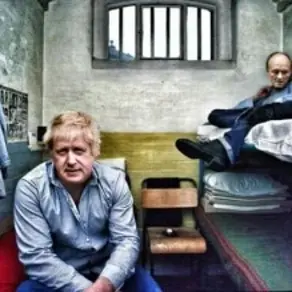
A chantie-wrassler wis a preesoner that gat oot his cell earlier nor the ithers for tae gang roond collectin an tuimin the chanties o the ither preesoners. He wis weel-in wi the screws an a bit o a souk. Ye dinna hear the wird muckle nou, but it wis a mild term o abuiss, aiblins affectionate.
-
John Swinney: SNP losing seats would not affect independence mandate
JOHN Swinney has said the SNP’s mandate for independence negotiations would not be invalidated if his party loses seats in the General Election.
A pro-independence majority supporting indyref2 was returned at the last Holyrood election in 2021.
Since then, the SNP's strategy – agreed at last year’s conference – states that winning a majority of Scottish seats at Westminster would trigger talks with the UK government to give “democratic effect” to independence.
- weegingerdug.wordpress.com Labour in Scotland, a fantasy manifesto from a fantasy party
If I were to tell you that a major political party had published a manifesto for this Westminster general election which was largely about a different election for a different parliament – an…
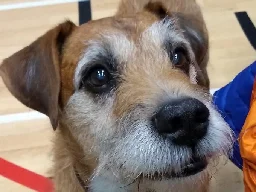
If I were to tell you that a major political party had published a manifesto for this Westminster general election which was largely about a different election for a different parliament – an election which isn’t due for two years, and that in its promises which do relate to Westminster it does not actually exist as a distinct political party, you might think that it would be laughed off the stage of its launch event and a furious media would tear into it for misleading the public and wasting everyone’s time.
But of course that would only happen in a sensible grown up universe, not this infantilised corner of the multiverse in which the media in Scotland colludes in and enables the deceptions and misrepresentations of Keir Starmer’s Scottish branch office.
Let’s start with the basics. Not only is “Scottish Labour” legally nothing more than an identifying mark for UK Labour in Scotland, as far as a Westminster general election is concerned, there is no such thing as a “Scottish Labour” manifesto.
How about starting with that democratic right of the people of Scotland to decide on Scotland’s future? Tell us exactly how the people of Scotland can exercise that right without being vetoed by a British Prime Minister Anas, then, just then, we might give you as hearing when you start to pontificate about democratic renewal.
- theconversation.com Farmers told me what they really think about reintroducing lynx and wolves to Britain and Ireland
To investigate what’s really behind the controversy that surrounds large carnivore reintroductions, one political ecologist spoke to people on the frontline of this debate.
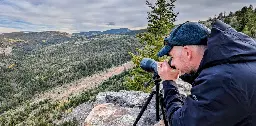
Lynx and bears probably disappeared from both islands much earlier, despite debates over the potential presence of lynx in early modern Scottish texts.
In Ireland, the evidence for lynx rests on a single bone from almost 9,000 years ago. But much more recently than this, wolves did not simply vanish from our lands – we got rid of them. We did so less because our ancestors read too many fairy tales, more because of a confluence of political and economic factors.
-
Megalith Map mega map browser. Ancient Sites in England, Scotland, Wales, Ireland : The Megalithic Portal and Megalith Map:
This map of Britain and Ireland, is divided into 100 kilometre squares Locations of prehistoric stone circles and stone rows are indicated by the red dots Click on a grid square to see that map sheet in greater detail Many of the pages have images and links to information elsewhere on the web making this a master index of Britain and Ireland's Prehistoric sites.
-
RSH Talks Politics With Big Maj

YouTube Video
Click to view this content.
I never ask but feel this yin's important since we've an upcoming GE - Scots should know about the history of 🏴 in 🇬🇧 & why only Scottish parties have our best interests.
-
How we’ve laid the foundations for billions to be clawed back from the PPE scandal
The PPE scandal is one of the most egregious examples of political sleaze and mismanagement of public money in recent memory. £10bn was wasted on unusable or unused PPE – and that’s a figure that’s come from the government’s own mouth.
So how on earth did the government go from being unable to provide basic PPE to frontline workers at the outbreak of Covid-19 to having vast stockpiles of substandard and useless protective gowns, masks, goggles and gloves we’re still paying millions to keep stored in containers, some of them owned by Tory donors?
-
Sky News questions on Keir Starmer and Rishi Sunak

YouTube Video
Click to view this content.
Scots give hilarious reactions to Sky News questions on Keir Starmer and Rishi Sunak
-
Silence over Brexit won't make it go away
Brexit is getting worse, not better. It is strangling the UK’s most important trading relationships. Now we have come through Covid it is getting easier to see that the UK is falling behind similar economies in terms of growth and productivity.
US investment bank Goldman Sachs calculated recently that the UK economy is 5% smaller compared to comparable countries than it was 8 years ago, before the Brexit vote.
Yet both major political parties don’t want to talk about Brexit and the build up of issues around it. That lack of honesty is poisoning the election campaign, perhaps best summed up by former government Minister Michael Heseltine who last week said that the July 4 general election will be “the most dishonest in modern times”. The leaders of the Conservative and Labour parties owe it to voters to acknowledge that Brexit is a disaster and to explain how they plan to deal with the situation.
- theconversation.com The Singapore Stone’s carvings have been undeciphered for centuries – now we’re trying to crack the puzzle
Despite its name, this sandstone slab is not a simple stone. It was once part of a monument, an ancient epigraph measuring three by three metres carrying about 50 lines of text.
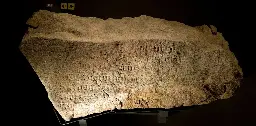
If you pay a visit to the Singapore Stone, displayed at the National Museum of Singapore, you might be disappointed. That's because the inscription—carrying an unknown writing system transcribing an unknown language—is fading. But if you love puzzles, this won't put you off.
The stone is a fragment of a bigger slab, once welcoming visitors at the mouth of the Singapore River. The British blew it up in 1843, to build a fort. Discovered in 1819, the stone was almost entirely lost.
Scottish military officer Lieutenant-Colonel James Low, amid general indifference, was able to save three fragments. He sent them to the Royal Asiatic Society's Museum in Calcutta to be studied.
Despite its name, this sandstone slab is not a simple "stone." It was once part of a monument, an ancient epigraph measuring three-by-three meters and carrying about 50 lines of text.
Not being able to understand the text of the epigraph, we cannot postulate a specific time frame for its origin. Hypotheses range from the 10th to the 13th century, but there is no consensus. Was the epigraph connected with the Majapahit empire? Or a gift by a rajah from south-eastern India, celebrating the deeds of the local legendary hero Badang? No one will know until we're able to read it.
The script is one of the major puzzles in language deciphering of our times. It's a conundrum in crypto and historical linguistics with apparently no solution. The challenge can be compared to the mysteries of better-known undeciphered writing systems, like Linear A and the Rongorongo script.
- pantheon.org sìth | Facts, Information, and Mythology
The Scottish Gaelic term for fairy, but also whatever is fairy-like, unearthly, not of this world.
sìth
The Scottish Gaelic term for fairy, but also whatever is fairy-like, unearthly, not of this world. They come and go with noiseless step, and their thefts or abductions are done silently and unawares to men. Their presence is also noticed when items have mysteriously disappeared or when family member or cattle have suddenly died. When driven away, they do so noiselessly and they seem to glide rather than walk. Generally their presence is indicated at most by the cloud of dust raised by the eddy wind, or by some curious natural phenomena, or by the sound of their musical instruments, songs, or speech.
A female fairy is called sìtheag or ban-sìthe and a male fairy bodach-sìthe. The elfin youth is called gille sìth. Other words for fairy are sìthiche and sìtheanach (both masculine). The term sìthbheire is mostly applied to changelings. A fairy godmother is called muime-sìthe. They are also called sluagh, "folk, a multitude," sluagh eutrom, "light folk," and daoine beaga, "little men," from the number and small size ascribed to the elves. Another term is daoine còire, "kindly folk," from a desire to give no unnecessary offence.
Fairies have a reputation for stealing, but they do not take anything away bodily, they only take what is called its toradh (fruit, produce, issue, yield). Only the outward appearance is left, but the reality is gone.
- theconversation.com How giant earthworms have transformed the Isle of Rum’s landscape
Earthworms act as ecosystem engineers and over centuries, they have shaped the landscape and changed the soils on the Isle of Rum in Scotland. Here’s how.
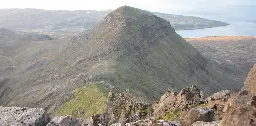
Renowned for a thriving and intricately studied population of around 900 red deer, the Isle of Rum, part of Scotland’s Inner Hebrides, is often considered an outdoor laboratory for scientific research. But the earthworms on Rum are equally remarkable. These invertebrates act as “ecosystem engineers”, actively shaping the landscape, often after humans have left their mark on this remote island.
Rum’s human history goes back 9,000 years. Early humans came here to collect bloodstone, a flint-like mineral used to make arrowheads and other hunting or cutting tools. The island was deforested by early humans and the wet climate (with more than 2m of rain per year) led to the leaching of soil nutrients. The resulting poor-quality acidic soil supported moorland plants and low numbers of just three earthworm species.
If nothing else had happened to Rum soils, then this would be a very unexciting place to undertake research on earthworms.
But subsequent human inhabitants improved soils sufficiently to eke out a living as tenant farmers at a few locations around the coast. They used kelp seaweeds to fertilise the cultivated land and enrich soil quality. Then, some 200 years ago, these hardworking people were forcibly removed from their settlements on Rum (and much of Scotland) in the “Highland clearances”.
Wealthy owners of Rum treated this island as a shooting and fishing estate for more than a century and kept most people away from what became known as the “Forbidden Isle” during the late 19th- to early 20th-century.
When Kinloch castle was built by the textile tycoon George Bullough in 1897, his wife, Lady Monica wanted to grow roses in the garden. To facilitate this and generally improve the landscape, Bullough imported 250,000 tonnes of good-quality Ayrshire soil to spread around their new home. They lived in this castle for just six weeks each year, but this human opulence changed the underground ecosystem significantly.
-
Independence lessons: How Ireland built a strong economy
Ireland is a stable and prosperous independent country. It has used the powers of independence to build a strong and diverse economy.
It has long been portrayed as the UK’s poor neighbour but much of that due to the economic exploitation of Ireland by the UK until the early 20th century.
Ireland enjoys the unique situation of being part of both the Common Travel Zone and the EU single market. It has an educated, dynamic workforce which makes it attractive to investment. All nations have issues and improvement needs, of course they do, but Ireland has used its economic prosperity in ways that mean it now outperforms the UK in most metrics that measure the health and happiness of the population.
Of course, Ireland and Scotland are different in many ways - but it is instructive to look at Ireland’s success as a small independent nation.
Where is Ireland today?
When Ireland joined the EU in 1972, its per capita income was only 60% of the average. Now it is at least 100% of the average and by some measures, it scores even higher.
- www.theguardian.com England’s restrictive rural access rules cost six times that of Scotland’s, figures show
Exclusive: Restrictive nature of rules in England were costly to define and uphold, costing £69m to implement
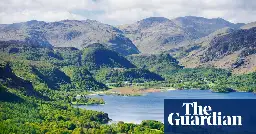
Exclusive: Restrictive nature of rules in England were costly to define and uphold, costing £69m to implement
England’s model for countryside access cost six times more to implement than Scotland’s right to roam policy, new figures reveal.
In England, only 8% of the countryside is open for walking, picnicking and other outdoor activities. This includes footpaths, the coastal path, mountains, moors, heaths and downs. In Scotland, all of the countryside is open for access as long as guidelines are followed such as leaving no trace and not harming farmland.
- bellacaledonia.org.uk Reservoir Dogs
Years ago people predicted ‘resource wars’ as natural resources like food and water became more and more scarce due to climate change. We’re in that future now, deep into it, and …
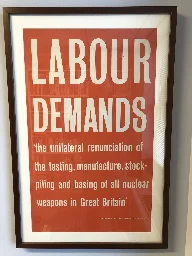
This is stealing from Jackie Baillie’s playbook. Normally it is Scotland that is being sold the idea of Weapons of Mass Destruction as a job creation scheme. But, as in most things Scotland doesn’t really matter in this election. We all know it, and John Curtice keeps (re) explaining it, but Scotland really doesn’t matter. Starmer is sailing into No 10 on a high-tide of revulsion against the inept and corrupt Tories, but we have to keep up the pretence that Scottish votes matter. 200,000 + Scots will be in Germany in July and damn few of them will be thinking about a postal vote. But, who cares?
It’s not true, as I have said earlier that Labour offers no change at all. They have successfully re-packaged British nationalism, re-framed a bellicose militarism in celebrating Trident as the basis for a social contract, hollowed-out any remnant principled MPs and remarkably successfully managed to be complicit in support of live genocide with, apparently, no discernible negative electoral impact.
- www.theguardian.com Scotland’s remote land of bogs and bugs in line for world heritage status
A decision from Unesco on giving the peat-rich Flow Country the same standing as the Great Barrier Reef is just weeks away
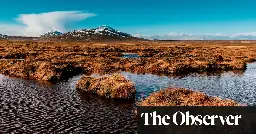
A decision from Unesco on giving the peat-rich Flow Country the same standing as the Great Barrier Reef is just weeks away
It is a land of mire, mist and midges that could soon be awarded a special status among the planet’s wild habitats. In a few weeks, Unesco is set to announce its decision on an application to allow the Flow Country in north Scotland to become a world heritage site.
Such a designation is only given to places of special cultural, historical or scientific significance and would put this remote region of perpetual dampness on the same standing as the Great Barrier Reef, the Grand Canyon and the Pyramids.
-
Postal votes one way to minimise the damage from the UK’s draconian Voter ID law
This General Election will be the first in Scotland where voters are required to show photo ID - unless they apply for a postal vote. Many commentators have warned that it will reduce voter turnout. It could affect tens of thousands of Scots.
Voter turnout was lower than usual in this month’s English local elections. In the London mayoral race. it was 1.5% down on the 2.5 million votes from 2021 - that amounts to almost 40,000 people who didn’t get their say. There is no other obvious cause of this discrepancy and it is likely that the new rules have depressed turnout.
Don’t be deterred by a confusing message
The deadline for applying for a postal vote is June 19. You can apply online. Don’t be deterred by the confusing message that comes up when you say you live in Scotland. The screen will say ‘You cannot apply for a Scottish election using this service’.
Unionists, who regard general elections as Scottish as much as they are English, might find this remark particularly misleading. Many people at that point log off, concluding they will have to organise a paper form. But it actually just means you can’t apply online there for a Holyrood election. If you select ‘UK election’ in the menu below the message, you can continue with the process.
You will have to put in your address, National Insurance number and upload a photograph of your signature and your face. If you have difficulty, ask for help at your local library or contact your local electoral office.
-
Creamola Foam
Creamola Foam was a soft drink produced in the form of soluble crystals. It was manufactured in Glasgow and sold mainly in Scotland from the 1950s until Nestlé ended production in October 1998.
In 2005, Allan McCandlish of Cardross started producing a re-creation of Creamola Foam under the name Kramola Fizz.
In April 2019 his daughter Agnes and son Andrew of McCandlish Farmhouse Confectionery relaunched the product under its rightful name of Creamola Foam (registered Trademark) and is now available on the shelves again in Scotland as well as worldwide.
An alternative product called Krakatoa Foam was manufactured by Ally Bally Bees Ltd, based in Fife who went into liquidation in 2014.
-
Gardyloo: The grim story of unsanitary Edinburgh
More than 50,000 people were crammed within the city walls, livestock wandered freely down the streets and a holler of “gardyloo” gave passersby the message to move away - sharpish.
Coming from the French expression, “Prenez garde a l’eau!” - meaning literally ‘beware of the water’ - gardyloo was the phrase shouted from the upper floors of tenement buildings by residents as they emptied their chamber pots from the windows above.
- www.makforrit.scot How to read Scots: A brief introductory guide (written in English)
Ay, ay. Welcome to this introduction to reading the Scots language. It's intended mainly for Scots and Scottish English speakers who are after some guidance on reading Modern Scots. Other English speakers are welcome to…

Scots is both a spoken and written language, and has been for centuries.
Scots is a Germanic language — originating from a fusion of Anglo-Scandinavian, French, Latin, Gaelic and Dutch — spoken mainly in the Scottish Lowlands and Northern Isles.
Scots is, to a decent extent, intelligible to speakers of English, which can lead many to mistake it for a dialect of English.
-
Electoral Commission website, where you can register a complaint.
If you wish to complain about @theSNP being excluded from TV debates - and the fairness of the media coverage during this election period - here's a link to the Electoral Commission website, where you can register a complaint.
-
A Dalek, a set of original sketches by Scottish science-fiction writer Iain M. Banks, and a handwritten inscription by Galileo are among items on display in a new exhibition in St Andrews that is out of this world.
Alien Worlds at the University of St Andrews’ Wardlaw Museum explores exoplanets – planets that our outside our Solar System – and how they have been understood, dreamt of and imagined by scientists, musicians, artists and writers for centuries.
Alien Worlds invites visitors to get involved directly in investigating exoplanets by contributing their own creativity, asking them to finish a science-fiction story, create their own exoplanet to be displayed through the portholes of the exhibition’s “Command Centre”, or travel in their own imagination by reading a piece of science-fiction or listening to a piece of music that imagines an exoplanet.
https://news.st-andrews.ac.uk/archive/new-wardlaw-exhibition-seeks-answers-from-the-great-beyond/
- bellacaledonia.org.uk Hurtling Backwards
The Tories are running the most inept and chaotic election campaign ever seen as they slide into electoral oblivion. In desperation they have plucked National Service out of the ether in an attempt…
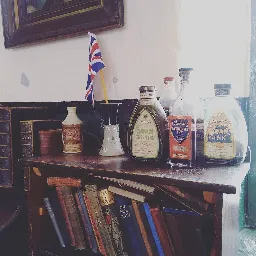
The Tories are running the most inept and chaotic election campaign ever seen as they slide into electoral oblivion. In desperation they have plucked National Service out of the ether in an attempt to shore up their elderly vote. It’s a catastrophic idea described hilariously by a pliant media as “the first major policy announcement of his election campaign”.
Sunak is playing to a playbook that seems familiar to many, this is Project Fear 2.0, in which brave Little Britain is surrounded by enemies and threats – the Chinese, the Russians, the Scots – its a continuation of the Brexit themes of False Victim Status.
A large current of it stems from a set of assumptions about a false victim status that England cradles in its arms. From Boris and his Bananas to the grand presumptuousness of ‘Thirty Years of Hurt’ to the Brexit campaigns squalid, racist NHS broadcasts – to Farage’s foul conflation of sexual and racial threats – the false sense of entitlement and idea that England/Britain has been stolen or undermined by some external force (not the failed elite they elect) is palpable and enduring.
-
David Cameron vetoes Rockall fishing agreement between Scotland and Ireland
www.thenational.scot /news/24347056.david-cameron-vetoes-rockall-fishing-agreement-scotland-ireland/FOREIGN Secretary David Cameron has vetoed an agreement between Scotland and Ireland to allow Irish fishermen access to the rich fishing grounds around Rockall.
Ownership of the tiny granite islet 230 miles off the coast of the Outer Hebrides in the Atlantic is disputed by the UK and the Republic of Ireland 263 miles to the south.
Irish vessels, which traditionally fished the waters around the remote rock for haddock and squid, were barred from a 12-mile territorial zone around it after Brexit, when the UK left the EU’s Common Fisheries Policy.
Despite the Irish and Scottish governments spending two years agreeing an access deal – fisheries are a devolved power – it has now been shut down by the Foreign Office following the announcement of a General Election.
The deal involved Irish marine scientists carrying out research in the area that would be passed on to the Scottish fishing fleet in return.
The UK Government said it vetoed the deal because it could not see the benefits for Scottish fishermen, who have opposed letting Irish boats back in.
Sources said the reason was entirely political - UK Govt didn't want to be seen agreeing a deal with an EU nation
-
Thoughts on the EU
Q: An Independent Scotland should rejoin the EU - Yes 80%
This is pretty much what we would have expected to see, Brexit itself has had a major impact on independence support since 2014 with some polls indicating that approximately 90% of No to Yes Switchers were motivated by Brexit and see the opportunity to rejoin the EU as one of the key benefits of independence. Those voters may have been put off independence in 2014 by the Better Together lie that only voting NO protected EU membership.
